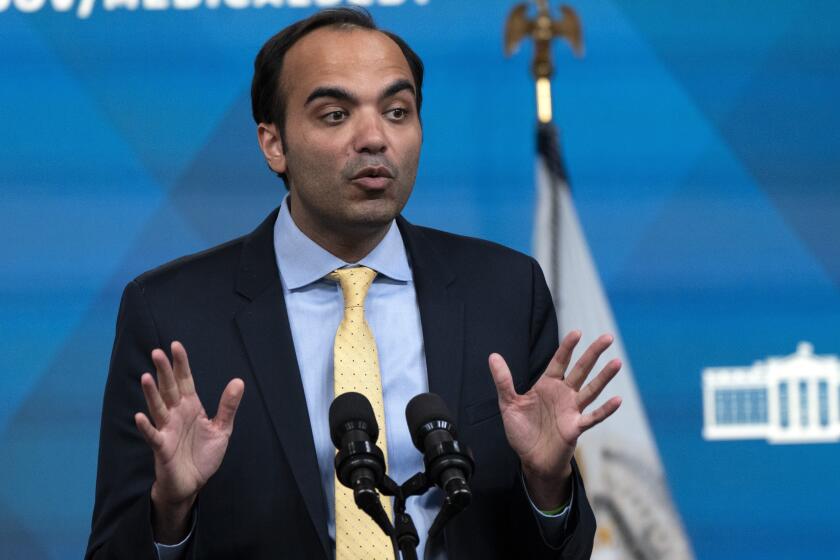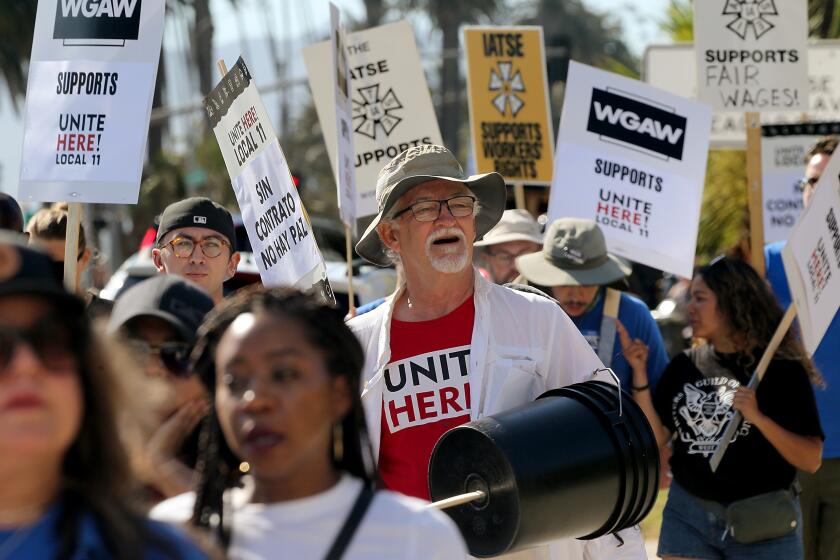Powell’s Role Watched as FCC Drafts Phone Rules
The long-running battle over new telephone competition rules will reach a crucial showdown next week when top aides at the Federal Communications Commission meet behind closed doors to hash out the written details that will govern the multibillion-dollar local-phone industry.
More than two months after a contentious vote on an outline of the rules, the five FCC commissioners are struggling to produce an order that conforms to the majority’s vote to preserve a helping hand for companies that compete against the Baby Bells.
A split vote -- such as their 3-2 decision in February to keep basic parts of the Bells’ networks available to rivals at discounted prices -- wouldn’t normally cause such lengthy delays. But in this case, one of the dissenters is the chairman, Michael K. Powell, who controls the overall rule-writing process.
That apparent conflict of interest worries critics, and some wonder privately whether Powell is trying to sabotage the order with inconsistent language that would cause it to be overturned in court.
Powell did not return calls. Top aides denied that the chairman has any ulterior motive.
At stake is the continued viability of nascent competition in the local-telephone business, which is giving consumers in some states, including California, more choices of carriers and lower prices.
The Baby Bells, such as SBC Communications Inc., California’s dominant local carrier, contend that the rules force them to subsidize the operations of competitors by allowing them to enter their local markets with no investment.
AT&T; Corp. and other rivals say they need cheap rates to build enough market share to justify the expense of installing their own equipment. They say the higher wholesale fees the Bells want to charge would erase any significant competition.
Powell, who sought to ease federal rules and let the Bells charge higher wholesale rates, lost his bid in February after a bruising battle with fellow Republican Commissioner Kevin J. Martin and the FCC’s two Democrats, Michael J. Copps and Jonathan S. Adelstein.
The continuing discord resurfaced last week when Powell said he was embarrassed that the written order isn’t finished yet. He said then that he was done with his part and that “not being in the majority means not controlling the drafting” process.
But insiders say that as chairman, Powell has a firm hand on the overall writing process, particularly because he voted with the majority on one issue relating to high-speed fiber optic services. Experts note that when he lost key parts of the February vote, he stridently stated that the majority’s view was legally unsound and would be overturned in court.
Critics inside and outside the FCC say the first draft of the order, which Powell approved, contained inconsistent language that would give a judge reason to reverse it.
“People are holding their powder to see what’s coming out, but there’s a strong aroma of skulduggery,” said Bruce Fein, a former FCC general counsel who maintains strong ties to the agency.
A revised draft was delivered to commissioners late Wednesday evening. It runs to about 500 pages, with an additional 200 pages of rules on implementation. Staffers say the majority will need a day or two to determine whether the extensive changes they demanded were made.
Legal advisors for each commissioner are scheduled to meet next week to go over any additional changes. They hope to have a final draft ready by early June, insiders said.
One FCC staff member said Powell had no conflict of interest and was not trying to scuttle the parts of the order that he opposes.
“When we say to other offices that we are dissenting from part of the decision, an [internal] rule prohibits us from drafting that part of the decision,” the insider said.
Commissioners usually vote on a proposal that already has gone through several drafts, insiders said. But in February, they voted on several dozen summary pages of what they intended to order.
“The problem is that the commission adopted something that wasn’t written down in the first place,” one staffer said.
A half a dozen sources inside and outside the FCC said the first draft of the order failed to reflect -- and in some cases contradicted -- the majority’s views about maintaining regulatory control over the basic parts of the Bells’ networks that rivals need for offering services.
Two key problem areas in the first draft were the definition for the so-called impairment standard and the language in the section on switches, gear that Powell believes almost any competitor could buy without burdening itself financially.
A competitor is considered impaired whenever the cost of installing a particular network element -- such as lines or switches -- would prevent it from offering service. The Bell equipment then would be deemed necessary, allowing the rival to rent those network parts at deep discounts.
Competitors selling local or long-distance service see no difference between using old-fashioned copper lines and high-speed fiber optic cable. Either way, they are impaired because they can’t afford to dig up streets to lay the lines they would need for their own networks.
The problem in the first draft, sources said, is that Powell’s view of the impairment standard as applied to fiber optic lines doesn’t jibe with the majority’s view of impairment when it comes to regular voice lines. All five commissioners have to agree on the definition because the same standard must be applied across the board.
As for the section on switches, the majority essentially asked for a complete rewrite with attention to the economic and operational difficulties competitors face, sources said.
“A lot more goes into it than just buying a switch,” one staffer said. For instance, rivals have to move lines from the Bells’ switches to their own and get enough space in the Bells’ same central offices to do that.
How the commissioners view the second draft could determine how long the fight will continue. Insiders say that despite the difficulties, they hope to get the job done within a month.






